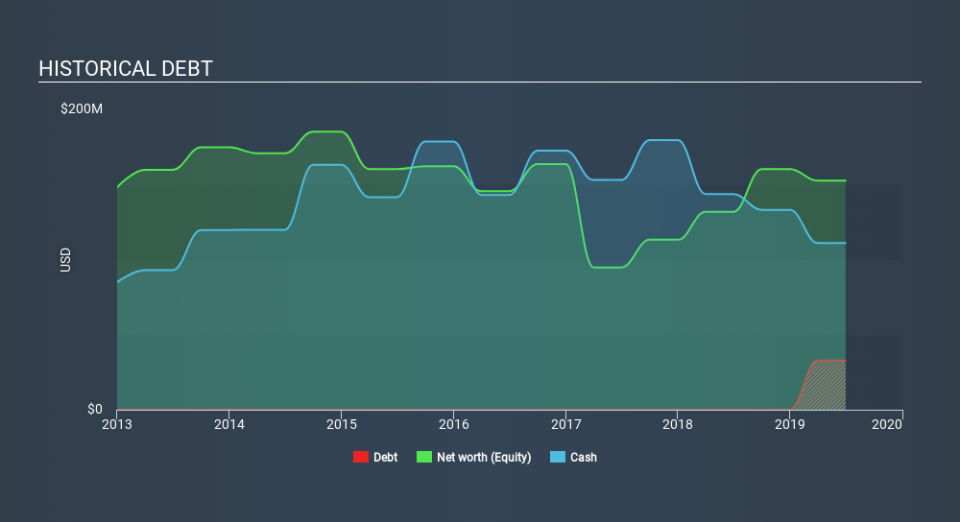We Think 888 Holdings (LON:888) Can Stay On Top Of Its Debt

Some say volatility, rather than debt, is the best way to think about risk as an investor, but Warren Buffett famously said that 'Volatility is far from synonymous with risk. So it might be obvious that you need to consider debt, when you think about how risky any given stock is, because too much debt can sink a company. As with many other companies 888 Holdings plc (LON:888) makes use of debt. But should shareholders be worried about its use of debt?
When Is Debt Dangerous?
Generally speaking, debt only becomes a real problem when a company can't easily pay it off, either by raising capital or with its own cash flow. Part and parcel of capitalism is the process of 'creative destruction' where failed businesses are mercilessly liquidated by their bankers. However, a more frequent (but still costly) occurrence is where a company must issue shares at bargain-basement prices, permanently diluting shareholders, just to shore up its balance sheet. Having said that, the most common situation is where a company manages its debt reasonably well - and to its own advantage. When we think about a company's use of debt, we first look at cash and debt together.
View our latest analysis for 888 Holdings
What Is 888 Holdings's Debt?
You can click the graphic below for the historical numbers, but it shows that as of June 2019 888 Holdings had US$32.8m of debt, an increase on none, over one year. However, its balance sheet shows it holds US$111.0m in cash, so it actually has US$78.2m net cash.
A Look At 888 Holdings's Liabilities
The latest balance sheet data shows that 888 Holdings had liabilities of US$265.9m due within a year, and liabilities of US$21.6m falling due after that. On the other hand, it had cash of US$111.0m and US$43.8m worth of receivables due within a year. So it has liabilities totalling US$132.7m more than its cash and near-term receivables, combined.
Given 888 Holdings has a market capitalization of US$734.9m, it's hard to believe these liabilities pose much threat. However, we do think it is worth keeping an eye on its balance sheet strength, as it may change over time. While it does have liabilities worth noting, 888 Holdings also has more cash than debt, so we're pretty confident it can manage its debt safely.
The modesty of its debt load may become crucial for 888 Holdings if management cannot prevent a repeat of the 23% cut to EBIT over the last year. Falling earnings (if the trend continues) could eventually make even modest debt quite risky. When analysing debt levels, the balance sheet is the obvious place to start. But it is future earnings, more than anything, that will determine 888 Holdings's ability to maintain a healthy balance sheet going forward. So if you're focused on the future you can check out this free report showing analyst profit forecasts.
But our final consideration is also important, because a company cannot pay debt with paper profits; it needs cold hard cash. While 888 Holdings has net cash on its balance sheet, it's still worth taking a look at its ability to convert earnings before interest and tax (EBIT) to free cash flow, to help us understand how quickly it is building (or eroding) that cash balance. During the last three years, 888 Holdings produced sturdy free cash flow equating to 77% of its EBIT, about what we'd expect. This free cash flow puts the company in a good position to pay down debt, when appropriate.
Summing up
While 888 Holdings does have more liabilities than liquid assets, it also has net cash of US$78.2m. And it impressed us with free cash flow of US$46m, being 77% of its EBIT. So we don't have any problem with 888 Holdings's use of debt. We'd be motivated to research the stock further if we found out that 888 Holdings insiders have bought shares recently. If you would too, then you're in luck, since today we're sharing our list of reported insider transactions for free.
At the end of the day, it's often better to focus on companies that are free from net debt. You can access our special list of such companies (all with a track record of profit growth). It's free.
If you spot an error that warrants correction, please contact the editor at editorial-team@simplywallst.com. This article by Simply Wall St is general in nature. It does not constitute a recommendation to buy or sell any stock, and does not take account of your objectives, or your financial situation. Simply Wall St has no position in the stocks mentioned.
We aim to bring you long-term focused research analysis driven by fundamental data. Note that our analysis may not factor in the latest price-sensitive company announcements or qualitative material. Thank you for reading.

 Yahoo Finance
Yahoo Finance 
